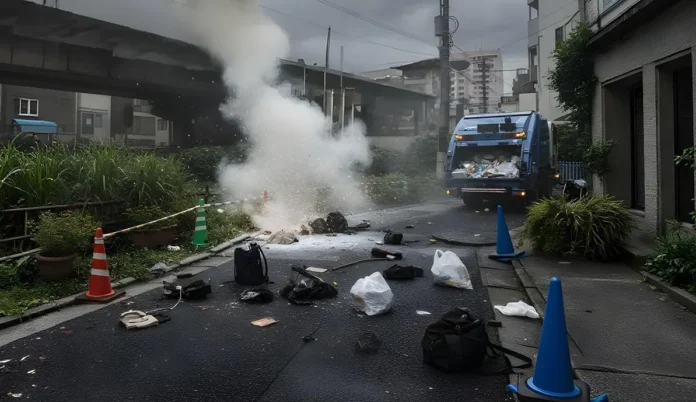Commuters Panic as Exploding Power Bank Sparks Fire and Renewed Safety Warnings
TOKYO, Japan — Passengers on a crowded commuter train in Japan were left terrified this week after a lithium-ion power bank exploded, filling a train car with smoke and forcing an emergency stop. Authorities have since confirmed that a faulty battery caused the fire, marking another alarming example of the growing danger associated with lithium-powered devices.
The incident occurred on a busy morning service in Tokyo, when a passenger’s portable charger, also known as a power bank, burst into flames without warning. Witnesses described hearing a loud pop followed by a flash of light and thick, acrid smoke spreading rapidly through the carriage.
“Everyone screamed and started running,” said one passenger who managed to escape unharmed. “The smell was toxic, like burning chemicals. It was chaos.”
The train staff quickly evacuated the car, and emergency services arrived within minutes to extinguish the smoldering device. No fatalities were reported, but several commuters were treated for smoke inhalation and minor burns.
Following the incident, Japan’s Consumer Affairs Agency issued an urgent safety advisory, warning the public about the risks of lithium-ion power banks and other rechargeable devices. The agency emphasized that faulty or poorly manufactured batteries can overheat, catch fire, or explode, particularly when overcharged or exposed to high temperatures.
“We are seeing a sharp increase in lithium battery-related fires,” said a spokesperson for the agency. “Consumers must be cautious when purchasing portable chargers or inverter batteries, particularly those imported from unverified sources.”
This explosion is just one in a string of similar incidents across Japan involving lithium-ion batteries in electronic devices, e-bikes, and home storage systems. Experts are calling it a “nationwide safety crisis” in the making.
Japan’s train fire adds to a growing international list of lithium battery disasters, from apartment fires in Germany to energy storage explosions in California and South Korea. In every case, the pattern is identical: overheating, explosion, and uncontrollable fire.
“Lithium-ion technology is inherently unstable,” explained battery safety researcher Dr. Hiroshi Takeda. “It takes only one damaged cell or one manufacturing flaw for a catastrophic reaction to occur. Once it starts, it cannot be stopped.”
When lithium batteries fail, they enter a chemical process known as thermal runaway, generating intense heat and flammable gas. Fires caused by lithium cells burn at extreme temperatures, releasing toxic fumes that endanger both people and property.
In response, safety officials in Japan are urging consumers to check their devices for recalls, avoid overcharging batteries, and stop using products that overheat or emit strange odors. The agency also warns against purchasing cheap or uncertified products online, where counterfeit batteries are prevalent.
“What happened on that train could happen anywhere, in homes, offices, or vehicles,” said Dr. Takeda. “People must understand that these devices are not harmless gadgets. They can explode without warning.”
As the world rushes toward electrification and “clean energy” dependence, the risks of lithium-ion technology are becoming harder to ignore.
The Japanese train explosion serves as another wake-up call: the same batteries powering modern life can just as easily set it on fire.
Read the Latest Battery News Shaping the Global Power Market
Lithium Battery Blows Up During Train Ride in Japan- Source


